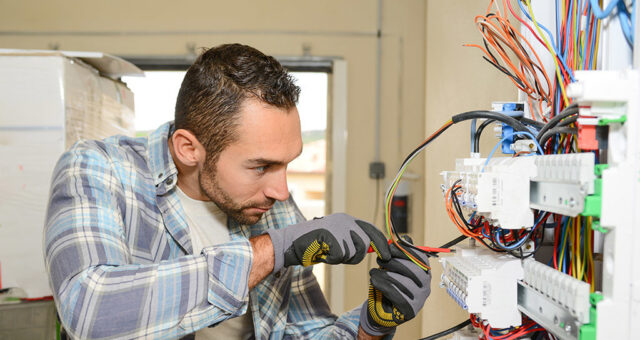What Types of Electricians Are There?


From our primary lighting and electrical utility needs to the mega-watt industrial and commercial wiring applications that keep thriving businesses, schools, hospitals, and data centers, humming, electricians are critical for the swift function of modern life. So what does it take to become one of these experts, and what types of electricians are there to choose from? For those eager to plunge into this field but don’t know where to start, let’s begin with the basics!
First, there are three types of electricians. The first, Journey Electricians, is the most basic level of an electrician. This type of electrician involves completing an apprenticeship and becoming a licensed electrician. These individuals can work independently but cannot provide training to apprentices, pull permits for electrical work, or lead a job site.
Second, there is a Master Electrician. These pros apply for this title after accumulating roughly two years of experience. Specific requirements fluctuate from state to state; however, licensing habitually demands that candidates complete an exam. Master electricians can lead jobs, provide training to apprentices, and manage electrical teams.
Third, there are Independent Electrical Contractors. Electrical contractors are basically small business owners. These individuals acquire teams of electricians to carry out jobs. Hence, electrical contractors must obtain a certain level of insurance and be either master electricians or have one present in their staff.
Diving deeper into the trade, let’s look at how electricians can generalize or specialize in one area:
Commercial Electrician: These workers specialize in tackling electrical issues in commercial buildings. These buildings handle slightly diverse types of power than residential buildings. Therefore, commercial electricians must have a certain amount of training under their belt in that specific environment during their apprenticeship.
Residential Electrician: Residential electricians zero in on repairing, installing, and preserving the electrical and wiring systems in small apartment complexes and homes.
Industrial Electrician: These electricians conduct electrical work in massive facilities that require heavy machinery and equipment. This includes manufacturing facilities, chemical plants, and power plants. These buildings usually have more electrical demands than their commercial or residential counterparts.
If you are becoming an electrician and need an electrician’s license or permit, we have a sweet deal for you! Colonial Surety Company’s I-bonds® or instant surety bonds are available for instant quote, purchase, print, or e-file from your mobile device or home computer. We are an innovative, digital, and direct provider of license and permit bonds and we are licensed and admitted in all 50 states, so wherever you may reside in the US, get your bond today. Click here to get your bond now.

